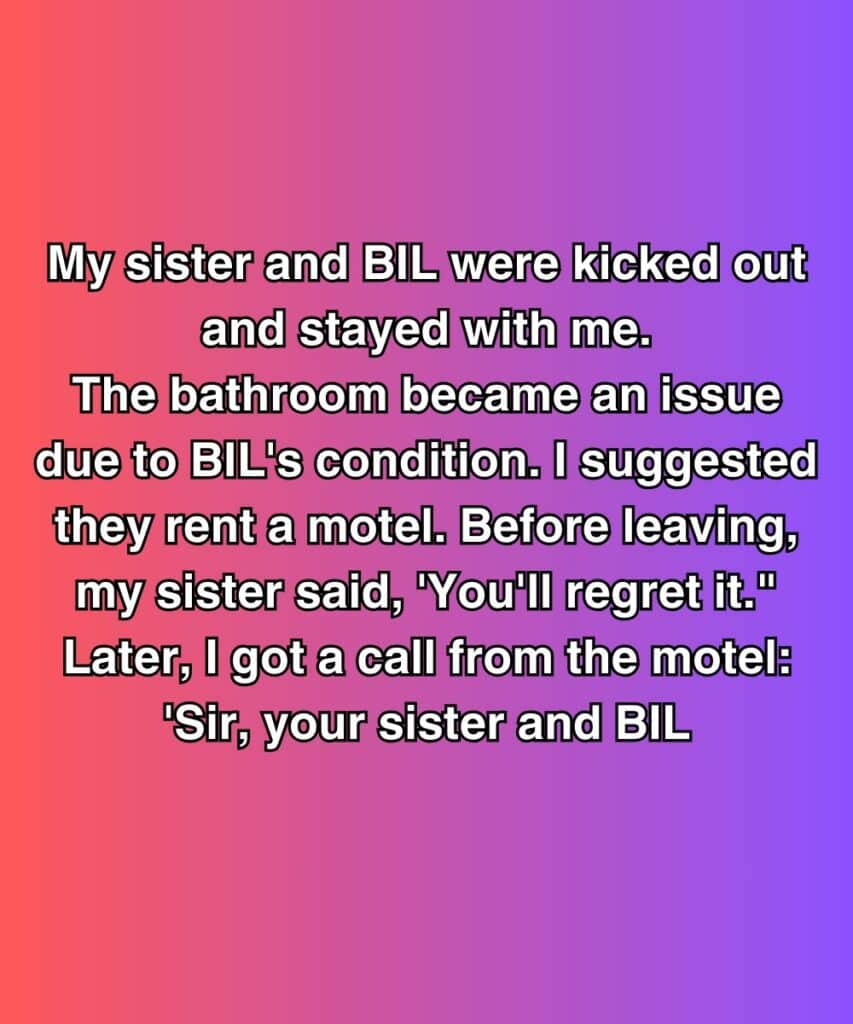When the motel called, I already knew it wasn’t going to be good news.
“Sir, your sister and brother-in-law… have been taken to the hospital.”
Everything in me dropped.
Back up a second. My sister, Nareen, and her husband Raj had been clinging to life in one of those glassy Vancouver high-rises you see in real estate ads. Then Raj’s health blindsided them—a neurological mess that scrambled his balance and his bladder, and then his job. Bills snowballed. The eviction showed up like a final slap.
When she phoned me, her voice had that brittle calm she uses when the ground is moving. My place is small—two bedrooms, one bathroom—everything in its labeled bin, everything where I like it. But I said yes. Family is family. I cleared out the spare room, stocked the fridge, ordered a toilet seat with handles. We figured we could make it work.
For a week, we did. Raj stayed in bed mostly; Nareen hovered. Then reality crashed in. Not little hiccups—big ones. Wet cushions. Towels heaped in the tub, sour and heavy. One night I padded to the bathroom and went skating on something I didn’t see. Bare feet. Cold. I snapped.
“I’m not running a care home,” I told Nareen in the morning, trying to keep my voice from shaking. She looked wrecked and suddenly sharp.
“What do you want me to do? I’m doing everything I can.”
“Maybe… a motel. Just for a bit. While you figure out a better setup.”
She stared like I’d hit her. Helped Raj into his coat. “Fine,” she said, flat. At the door she tossed over her shoulder, “You’ll regret this.”
“Okay, Nareen,” I said, rolling my eyes because that’s what you do when you’re angry and tired and stepping over damp towels at 2 a.m.
They left. I exhaled for the first time in two weeks. Then the motel called. Medication. Something packed wrong. Something mixed with something it shouldn’t have been.
Twenty minutes later I was sprinting down a hospital hallway. Raj lay pale but stable. Nareen was folded into a plastic chair, splotchy and small.
“They said it was a bad interaction with food,” she whispered. “He’s okay. It was close.”
Guilt hit like a freight train. “I shouldn’t have made you leave.”
She shook her head, fresh tears. “I should’ve planned better. I’m just… drowning.”
I drove her—both of us—back to my place. No speeches. I pointed at the couch; she nodded. The next morning I called in sick. We built a system. Timers on our phones. A whiteboard on the fridge. My nurse friend came over and taught us tricks—how to lift without wrecking our backs, how to stack towels to save the floor, how to line the bed. It wasn’t pretty, but it was better. The house smelled like antiseptic and strong tea. We started breathing again.
Then the universe pulled a string I didn’t know existed. A guy from Raj’s old company in Burnaby called, asking for him. Something about an old patent, a codebase a competitor had poached, a settlement that finally cleared. “He’s listed as a contributor,” the guy said. “It’s substantial.”
I gave Nareen the number. The next day she called me, laughing and crying at the same time. It was real—close to six figures real. Enough to move the mountain that had been sitting on their chests.
We ate takeout at my kitchen table that night, the three of us. Raj upright, hands steadier, making a joke about hospital meatloaf like it hadn’t tried to kill him. For the first time in months, we laughed without it sounding like a leak.
Two weeks later they found a ground-floor apartment close to the clinic. Private bathroom. Small yard. Sun on the back steps. They lingered long enough for me to label their new med organizer and shove extra towels into a box.
At the door, Nareen hugged me hard. “You didn’t fail us,” she said into my shoulder. “You saved us. Even when you couldn’t see it.”
After they left, my place felt wrong—quiet in all the places their life had filled. I missed the soft squeak of the walker. I missed the way Nareen hummed when she heated Raj’s tea. The towels sat folded in a smug little tower.
A package arrived a week later. No return address. Inside, a framed photo of the three of us on the hospital lawn, grinning like idiots in bad lighting. And a note: “Forgiveness builds bridges. And sometimes, bridges lead to better places.”
They invited me for dinner in their new yard a few months after. Raj walked twenty steps without help. Nareen had clients again, little invoices lined up like soldiers on her laptop. They had color in their faces. I drove home full in that quiet way that doesn’t need words.
The bank called the following week. “Your overdue balance is cleared,” a cheerful voice chirped. I hadn’t paid it yet. I knew who had. I called Nareen ready to scold her. She said, “You didn’t owe us a room. But you gave it anyway. Let us return the grace.”
I used to think boundaries were a fortress—big walls, one gate. Now I think they’re more like railings: something to hold while you walk the hard parts together. Sometimes “no” is love. Sometimes “yes, but let’s do it right” is, too.
I do regret kicking them out. Not because I was wrong to need a line—because I thought the line meant I had to stop caring. Regret taught me empathy. Empathy gave me back my family.
If you’re standing on that edge—between your comfort and someone else’s crisis—maybe this is your nudge. You don’t have to bleed to help. You just have to stay, adjust, ask for a better plan, and try again. You never know what your small, stubborn support might help someone survive.
